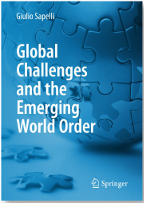Global Challenges and the Emerging World Order

04.06.2015
Giulio Sapelli
Springer
This book offers a fascinating overview of the challenges posed by
the world’s new geostrategic order and likely future directions. It
opens with an unconventional view of the Arab Spring, identifying its
origins in the relative US withdrawal from the Middle East caused by
both the need for military disengagement for economic reasons and the
discovery of shale gas and tight oil in the heart of the North American
continent.
The rise in the geostrategic importance of Putin’s Russia is explored in
this context. The implications of the worldwide economic crisis are
analyzed in depth: the author’s interpretation is that the world is
entering a phase of unstable growth generated by hyperfinancialization
and deflation. Against this background, the book explores the US attempt
to trigger growth through the Transatlantic Trade and Investment
Partnership, the impact of the Trans-Pacific Partnership (based on the
US-Australia military alliance) in restraining China’s advance, and the
potential for Africa to become the driver of the world’s economic future
if it can resist Chinese penetration and continue the nation-building
process.
***
“Mentre l’Europa si perde nella sua stagnazione più che nella sua
depressione, la Russia appare sempre più isolata, la Cina potente e
aggressiva, gli antipodi più lontani.”
Un affresco affascinante, nutrito di storia, economia, antropologia, per
decodificare un presente sempre più complesso e multiforme, in cui la
sfida energetica si conferma decisiva e la promozione di un nuovo ruolo
per l’Europa diventa determinante anche per il nostro Paese.
This book offers a fascinating overview of the challenges posed by the world’s new geostrategic order and likely future directions. It opens with an unconventional view of the Arab Spring, identifying its origins in the relative US withdrawal from the Middle East caused by both the need for military disengagement for economic reasons and the discovery of shale gas and tight oil in the heart of the North American continent.
The rise in the geostrategic importance of Putin’s Russia is explored in this context. The implications of the worldwide economic crisis are analyzed in depth: the author’s interpretation is that the world is entering a phase of unstable growth generated by hyperfinancialization and deflation. Against this background, the book explores the US attempt to trigger growth through the Transatlantic Trade and Investment Partnership, the impact of the Trans-Pacific Partnership (based on the US-Australia military alliance) in restraining China’s advance, and the potential for Africa to become the driver of the world’s economic future if it can resist Chinese penetration and continue the nation-building process.
***
“Mentre l’Europa si perde nella sua stagnazione più che nella sua depressione, la Russia appare sempre più isolata, la Cina potente e aggressiva, gli antipodi più lontani.”
Un affresco affascinante, nutrito di storia, economia, antropologia, per decodificare un presente sempre più complesso e multiforme, in cui la sfida energetica si conferma decisiva e la promozione di un nuovo ruolo per l’Europa diventa determinante anche per il nostro Paese.
